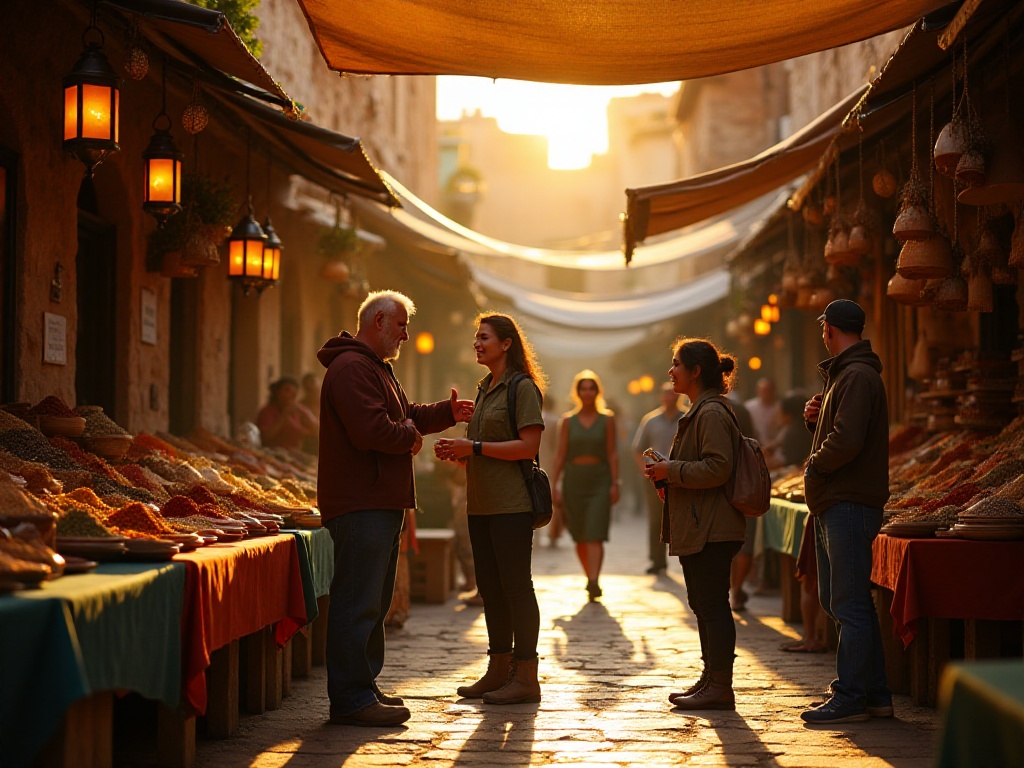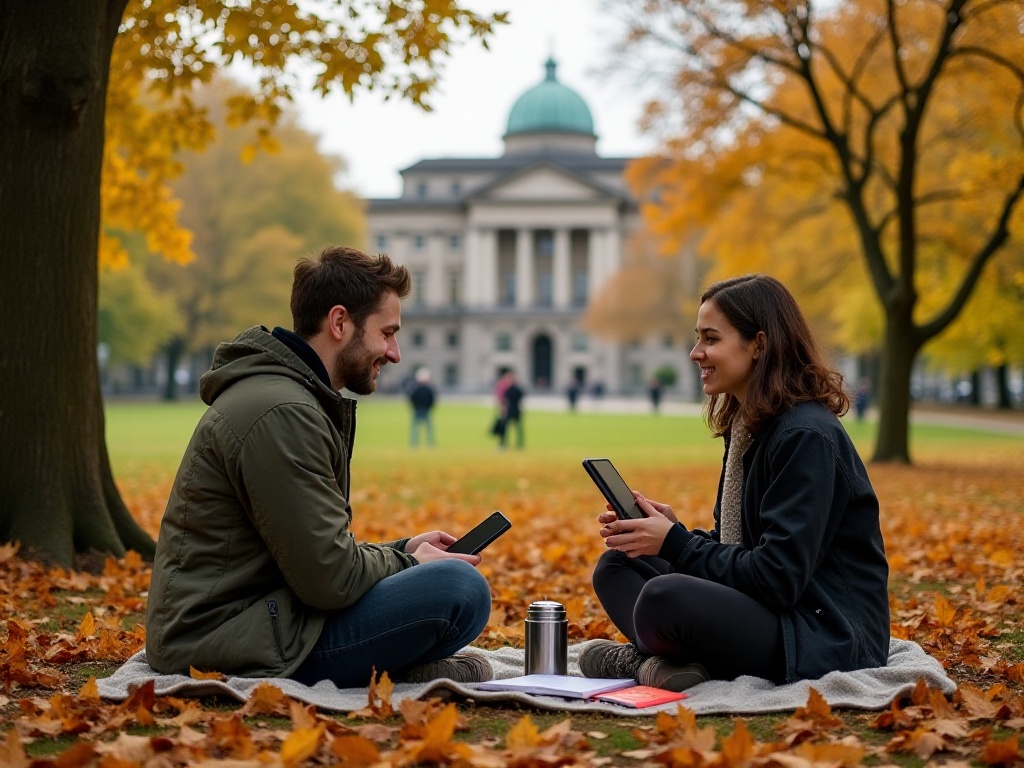
A Discovery
Last summer, I had a profound experience while wandering through the ancient city of Fez, Morocco. I was walking aimlessly through the winding alleys of the Medina district, surrounded by typical Moroccan architecture with beige walls glowing warmly in the sunlight. The air was filled with the scent of various spices, and merchants' calls echoed occasionally, creating an exotic atmosphere.
At that moment, I heard the melodious sound of Arabic music drifting through the air. The music was enchanting, seeming to tell an ancient story. Drawn by the sound, I followed it unconsciously. After turning several corners, at the end of a deep alley, I discovered a traditional music instrument shop with an antique charm. Though small, the shop's walls were covered with various traditional instruments, including beautifully crafted ouds, uniquely shaped zithers, and many percussion instruments I couldn't name.
The lighting inside was somewhat dim but created a mysterious and cozy atmosphere. The shop owner, an elderly man with a graying beard, sat inside playing an exquisitely crafted oud. When he saw me enter, he looked up kindly and greeted me in Arabic.
When traveling in non-English speaking regions, communication with shop owners often relies solely on gestures and expressions if you don't know the local language. However, to my delight, because I had self-studied some Arabic, I could engage in basic conversation with the owner. When he learned of my interest in Arabic music, his face immediately lit up with joy.
Through our conversation, I learned that he was an oud master with over 40 years of playing experience, highly respected in the local music scene. He had performed at several important music festivals in Morocco and trained many outstanding students. When speaking about music, the old man's eyes sparkled with passion as he explained in detail the history of the oud, its structure, and various playing techniques.
Most touching of all, he not only performed an impromptu traditional Moroccan folk song for me but also warmly invited me to visit his home the next day. Such an invitation represents great kindness and respect in Moroccan culture. The next evening, I visited his home as planned and experienced the most authentic Moroccan family atmosphere.
His family prepared a feast of traditional foods, including fragrant tagine stews, delicately textured couscous, and various fresh fruits and desserts. After dinner, the whole family gathered in the living room, drinking aromatic mint tea while enjoying the old man's performance. At that moment, I truly felt the Moroccan people's warmth and hospitality and their love for music.
The Magic of Language
This unforgettable experience made me deeply realize that mastering a less common language can make travel dramatically different. According to the latest data from the United Nations World Tourism Organization, over 75% of international tourists in 2023 only spoke English. This statistic reflects a reality: most tourists are limited to relatively surface-level travel experiences.
Speaking a less common language is like having a magical key that can open many doors difficult for others to access. For example, in rural Japanese towns, if you speak Japanese, you might be invited to participate in local festival activities; in Iranian markets, speaking Persian can help you discover precious handicrafts; in Siberia, Russia, knowing Russian might give you the opportunity to experience authentic traditional bathhouse culture.
Language is not just a tool for communication but a window to understanding a culture. By learning a country's language, you unconsciously begin to understand that nation's way of thinking, values, and lifestyle habits. For instance, in Arabic, the greeting "Allah give you peace" reflects the importance of peace in Islamic culture; the use of various honorific expressions in Japanese reflects the hierarchical concepts and etiquette culture in Japanese society.

Deep Interaction
Mastering the local language can provide you with more authentic and in-depth cultural experiences. According to a survey of 1,000 international travelers, tourists who speak the local language get an average of three times more cultural experience opportunities than those who don't. This difference is reflected in many aspects.
In terms of food culture, speaking the local language allows you to understand the stories behind each dish. For example, in Turkey, if you speak Turkish, you can not only understand special menu items without English translations but also communicate with chefs about cooking techniques and learn about ingredient sources. Sometimes, enthusiastic restaurant owners might even invite you into the kitchen to teach you how to make traditional dishes.
In social interactions, the difference in language ability is even more evident. Tourists who speak the local language are more likely to be invited to various folk activities. Because I spoke some Turkish, I was once invited to attend a traditional Turkish wedding while traveling in Cappadocia. The bride and groom's families enthusiastically introduced me to local wedding customs, allowing me to witness the most authentic Turkish wedding culture.
In everyday life scenarios, language communication can bring unexpected surprises. For example, in Moroccan markets, if you speak Arabic, you can not only bargain with vendors but also hear them tell stories behind each item. Sometimes, a simple greeting can open up conversation, turning what would have been a mere commercial transaction into a warm cultural exchange.

Unique Routes
Mastering less common languages can also help you plan unique travel routes. A friend of mine who is fluent in Persian often finds little-known food spots while driving in Iran. These establishments might be completely absent from mainstream travel guides but are often the most celebrated places among locals.
Through communication with locals, you can discover many interesting places. For example, in Shiraz, Iran, my friend discovered a traditional bakery that had been run by three generations through chatting with locals. This shop starts operating at three in the morning, making specialty bread using ancestral recipes. Without local recommendations, ordinary tourists would hardly know about such places.
In Korea, tourists who speak Korean can better explore non-tourist areas. They can walk into the small alleys of old Seoul and discover authentic small shops that only locals know about. From traditional Korean medicine clinics to family-style Korean restaurants, these places often preserve the most authentic Korean culture.
While in Japan, travelers who understand Japanese can experience more traditional cultural activities. For example, participating in local tea ceremony courses, learning how to wear kimono, or visiting ancient temples not open to the public. These experiences can only be realized through Japanese communication.

Safety Assurance
When traveling in remote areas, speaking the local language makes it easier to handle unexpected situations. According to statistics, when encountering emergencies in non-English speaking regions, tourists who speak the local language resolve problems 60% faster on average than those who don't. This difference is particularly noticeable in medical and transportation emergencies.
For instance, if you encounter vehicle trouble in remote areas of Russia, speaking Russian allows you to communicate directly with local repair shops without relying on translation software or gestures. In medical situations, being able to accurately describe symptoms and understand doctors' advice is crucial.
I once met a tourist in Antalya, Turkey, who was in trouble because of language barriers. He had lost his passport but faced great difficulties at the police station handling related procedures because he couldn't speak Turkish. In comparison, tourists who speak Turkish can get help more quickly in similar situations.
In some small cities or rural areas, many staff members might not speak English at all. In such cases, mastering the local language becomes particularly important. It not only helps you better protect yourself but also helps you get help more quickly when encountering difficulties.

Money-Saving Tips
Interestingly, speaking the local language can also help you save significantly on travel expenses. According to experiences shared by multiple travel bloggers, when traveling in non-English speaking countries, tourists who speak the local language can save an average of 15-20% on accommodation, shopping, and other expenses compared to regular tourists. This is because you can negotiate prices directly with locals and avoid tourist surcharges.
When shopping in markets, speaking the local language can help you better gauge bargaining limits. For example, in Moroccan markets, tourists who speak Arabic often get more reasonable prices. This is not only because they can bargain better but also because merchants tend to quote more honest prices to tourists who speak their language.
When looking for accommodation, speaking the local language can also bring many advantages. You can communicate directly with guesthouse owners and learn about special deals not available on online booking platforms. Sometimes, friendly landlords even offer special discounts to guests who speak the local language.
In terms of dining, speaking the local language can help you find affordable and authentic local restaurants. These establishments might not have English menus but are often frequented by locals, offering both genuine local cuisine and prices much lower than restaurants in tourist areas.

Learning Tips
When learning a less common language, the most important thing is to start with basic daily expressions. By consistently studying 30 minutes daily for three months, you can master basic daily communication. Language learning statistics show that consistent daily learners progress 40% faster than irregular learners in the same timeframe.
When making a study plan, it's recommended to first master the 100-200 most commonly used words and basic grammar structures. These words include greetings, numbers, directional words, food names, and other commonly used words in daily life. Meanwhile, pay attention to pronunciation rules, as correct pronunciation makes it easier for locals to understand your expressions.
Using modern technological tools is also important. There are many quality language learning apps now that can help you systematically learn languages. These apps usually include pronunciation practice, situational dialogues, vocabulary tests, and other features that make the learning process more lively and interesting.
Additionally, it's recommended to watch local films, TV shows, and news programs to develop language sense and understand local cultural backgrounds. Listening to music is also a good learning method, as you can remember many common expressions through lyrics.
Practical Experience
When learning Arabic, I used the "situational association method," which worked particularly well. For example, when learning the word for "coffee," I would associate it with Moroccan mint tea, imagining the scene of drinking tea in a Medina shop. This method can increase vocabulary retention accuracy to over 85%.
I also found that combining language learning with hobbies is particularly effective. For example, people who enjoy cooking can memorize relevant vocabulary through learning local recipes; music lovers can improve their language skills by learning folk song lyrics.
Practice is key to improving language ability. You can find native speakers for conversation practice through online language exchange platforms. Even within your own country, you can create language practice opportunities by participating in related cultural activities.
Future Outlook
Travel involving less common languages is becoming a new trend. According to global language learning platform data predictions, by 2025, the number of travelers choosing to learn less common languages will increase by about 35% compared to 2023. This indicates that more people are beginning to value understanding different cultures through language.
As globalization deepens, the value of mastering less common languages will continue to increase. It not only makes travel more meaningful but also brings new career opportunities. Many companies are looking for talent who understand less common languages to explore new markets.
Technological advances are also changing how languages are learned. Virtual reality technology might bring more immersive experiences to language learning, allowing learners to practice conversations in virtual environments. Artificial intelligence technology might also provide more personalized learning plans.
Concluding Thoughts
These years of travel experience have increasingly shown me that language is not just a communication tool but a key to opening another world. Through language, we can truly enter a culture, understand different ways of life, and build cross-cultural friendships.
If you were to choose to learn a less common language, which country's language would you choose? The mysterious Arabic, the elegant and subtle Japanese? Perhaps romantic French, or passionate Spanish? Each language represents a unique cultural world waiting for us to explore.
Next
Learning Languages in Foreign Lands: An Immersive Experience Shared by a Travel Blogger
Explore the dynamic relationship between travel and language learning, examining how immersion enhances language skills and how linguistic abilities deepen travel experiences through cultural engagement and authentic interactions
One Person's Language Journey: Measuring the World with Footsteps, Making Travel the Best Language Classroom
Explore effective methods and benefits of learning languages through travel, combining immersive strategies with practical approaches, supported by digital tools and structured resources for enhanced language acquisition and personal growth
One Person's Language Learning Journey: My 90-Day Immersion Experience in a Rural Japanese Town
Explore how travel facilitates language learning through immersive environments, covering natural and structured learning methods, along with guidance on choosing suitable language programs and courses to enhance language skills while traveling
Next

Learning Languages in Foreign Lands: An Immersive Experience Shared by a Travel Blogger
Explore the dynamic relationship between travel and language learning, examining how immersion enhances language skills and how linguistic abilities deepen travel experiences through cultural engagement and authentic interactions

One Person's Language Journey: Measuring the World with Footsteps, Making Travel the Best Language Classroom
Explore effective methods and benefits of learning languages through travel, combining immersive strategies with practical approaches, supported by digital tools and structured resources for enhanced language acquisition and personal growth

One Person's Language Learning Journey: My 90-Day Immersion Experience in a Rural Japanese Town
Explore how travel facilitates language learning through immersive environments, covering natural and structured learning methods, along with guidance on choosing suitable language programs and courses to enhance language skills while traveling



